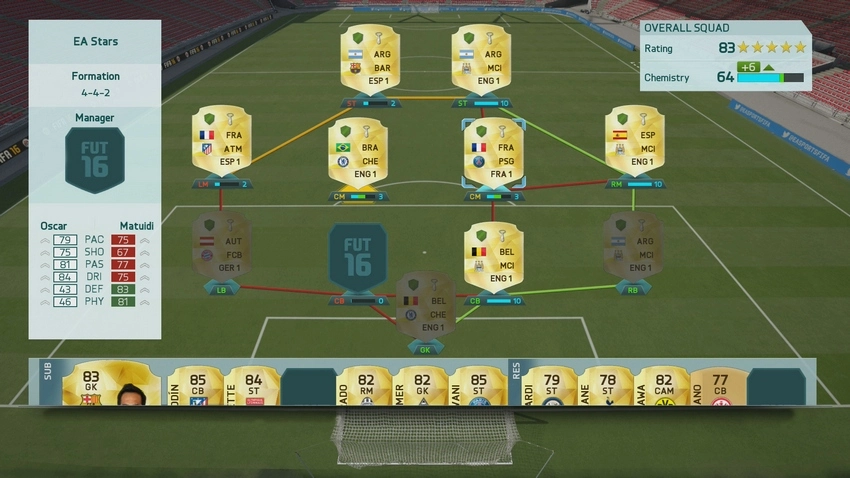FIFA 18 Team Chemistry Guide
Achieving high team chemistry in FIFA 18 is one of the most essential aspects of building a successful squad. Chemistry influences how well your players perform on the field, directly impacting their effectiveness in crucial gameplay situations. A well-balanced chemistry setup ensures that your team operates seamlessly, enhancing attributes such as passing accuracy, shot power, and defensive positioning.
On this page, we will explore the inner workings of FIFA 18’s chemistry system, its impact on gameplay, and actionable strategies to maximize your team’s chemistry for peak performance.
What Is Team Chemistry in FIFA 18?
Team chemistry in FIFA 18 serves as a fundamental gameplay mechanic that determines how well players perform during matches. It represents the harmony and cohesion within your squad, directly affecting your players’ abilities to execute precise passes, powerful shots, and strategic defensive plays. Chemistry is measured on a scale from 0 to 100, with 100 being the ideal score. A high chemistry score ensures that players operate at their maximum potential, while a low score can significantly hinder their performance.
The chemistry system is divided into two components:
- Team Chemistry: This is the overall score representing the collective harmony of the entire squad.
- Individual Player Chemistry: Each player has a personal chemistry rating that contributes to the team’s overall chemistry. Individual chemistry reflects how well a player fits into the team based on various factors such as position, links, and bonuses.
Understanding the balance between team and individual chemistry is crucial for creating a cohesive and high-performing squad. Without optimal chemistry, even a team filled with high-rated players can underperform.
How Chemistry Works in FIFA 18

The chemistry system in FIFA 18 operates on a set of principles that ensure realistic and balanced gameplay. Several factors influence both individual and team chemistry, and understanding these elements is essential for achieving the best results. Here are the key factors:
- Player Links: The most critical factor in determining chemistry is the relationship between players on the field. Players are connected by links, and the strength of these links is indicated by colors. Green links represent strong connections, such as shared nationality, league, or club. Orange links indicate weaker connections and red links show no compatibility.
- Manager Bonus: Managers play a vital role in boosting chemistry. A manager who shares the same league or nationality as the majority of your players can significantly enhance the team’s chemistry.
- Loyalty Bonus: Players who have played at least 10 matches for your club earn a loyalty bonus, which adds +1 to their chemistry.
- Positioning: Ensuring that players are placed in their preferred positions is essential for maintaining high chemistry. Playing a striker in a midfield position, for instance, can lead to a significant chemistry penalty.
The combined effects of individual and team chemistry are calculated using the formula:
Player Chemistry Effect = (Individual Player Chemistry × 0.75) + (Team Chemistry × 0.25)
This formula determines how chemistry influences player attributes during matches. A high chemistry effect ensures that players perform close to their full potential, while a low effect diminishes their effectiveness.
The Impact of Chemistry on Gameplay
Chemistry has a profound impact on gameplay, affecting nearly every aspect of a player’s performance. Players with high chemistry benefit from enhanced attributes, making them faster, more accurate, and more reliable on the field. Here are some specific ways chemistry influences gameplay:
- Passing: High chemistry improves passing accuracy, allowing players to deliver precise through balls and quick one-twos. Low chemistry, on the other hand, leads to misplaced passes and broken plays.
- Shooting: Players with strong chemistry are more likely to score from difficult angles and long-range shots. Low chemistry results in weaker and less accurate shots.
- Defending: High chemistry ensures that defenders maintain better positioning and make effective tackles. Low chemistry can lead to poor marking and susceptibility to counterattacks.
- Positioning: Chemistry influences how well players adhere to tactical instructions. High-chemistry players are more likely to stay in their assigned roles, while low-chemistry players may drift out of position.
The difference between a team with high chemistry and one with poor chemistry is most noticeable in competitive modes like FUT Champions, where every small advantage can determine the outcome of a match.
How to Build High Chemistry in FIFA 18
1. Focus on Strong Links
Building strong links between players is the cornerstone of achieving high chemistry. Strong links are established when players share common traits such as nationality, league, or club. For instance, pairing Lionel Messi with La Liga teammates or other Argentinian players creates green links that maximize chemistry. On the other hand, weak or mismatched links can reduce the overall chemistry score, even if the players are individually talented.
When assembling your squad, prioritize creating green links across the field. Look for opportunities to connect players with similar attributes, and avoid breaking critical links in key areas such as midfield and defense.
2. Use the Right Manager
Managers play an integral role in boosting team chemistry. A manager’s league and nationality must align with your squad to maximize their impact. For example, if your team consists mainly of Premier League players, choosing a Premier League manager can provide a substantial chemistry boost. Additionally, managers can equip consumable cards that further enhance their compatibility with your squad.
When selecting a manager, consider both their base attributes and their potential to improve your team’s chemistry. A well-matched manager can be the difference between a functional team and a dominant one.
3. Positioning Matters
Placing players in their preferred positions is one of the simplest yet most effective ways to maintain high chemistry. Each player has a natural position, and playing them out of position incurs penalties that lower their chemistry. To address this, use position modifier cards to adjust a player’s role to fit your formation.
For example, if you have a central attacking midfielder (CAM) but need a central midfielder (CM), applying a CAM to CM position modifier ensures the player remains effective without compromising chemistry. Always aim to have players in their ideal roles to maintain consistency across the squad.
4. Loyalty Bonus
Earning the loyalty bonus is a straightforward way to enhance individual chemistry. Players achieve loyalty after playing 10 matches for your club, granting an additional +1 to their chemistry. This bonus is especially valuable for newly acquired players or those obtained through Squad Building Challenges (SBCs).
To quickly earn loyalty, consider playing offline matches or squad battles. This allows you to build chemistry without the pressure of competitive gameplay. Once loyalty is achieved, the player becomes a permanent asset to your squad’s chemistry.
5. Hybrid Squads
Creating hybrid squads is a challenging but rewarding strategy for advanced players. Hybrid squads combine players from different leagues and nationalities while maintaining strong chemistry. This approach allows you to utilize a diverse range of talent without sacrificing cohesion.
To build a successful hybrid squad, identify players who serve as connectors between leagues or nations. For example, a player like Kevin De Bruyne, who represents Belgium and the Premier League, can bridge gaps between different player pools. Experiment with various combinations to find the perfect balance of talent and chemistry.
6. Chemistry Styles
Chemistry styles offer an additional layer of customization for your players. These consumable items allow you to boost specific attributes such as pace, shooting, or defense. While chemistry styles do not directly affect the chemistry score, they amplify the impact of high chemistry by tailoring players’ strengths to your gameplay style.
For instance, applying a Hunter chemistry style to a striker enhances their pace and shooting, making them a more potent attacking threat. Choose chemistry styles that align with each player’s role and responsibilities within your squad.
Common Chemistry Pitfalls to Avoid
1. Ignoring Positioning
One of the most common mistakes players make is ignoring the importance of positioning. Placing players in unsuitable roles can significantly reduce their effectiveness and lower team chemistry. Always use position cards to ensure that players are in their natural or modified positions.
2. Neglecting Links
Focusing solely on player ratings without considering links is another common error. While high-rated players can be appealing, their lack of compatibility with the rest of the squad can disrupt chemistry. Balance talent with cohesion to achieve optimal results.
3. Overlooking the Manager’s Role
A mismatched manager can leave valuable chemistry points untapped. Ensure your manager complements your squad’s league or nationality to maximize their impact. Don’t underestimate the difference a well-matched manager can make.
Advanced Tips for Maximizing Chemistry
1. Experiment with Squad Building Challenges (SBCs)
Participating in SBCs not only provides rewards but also helps you understand the nuances of creating high-chemistry squads. These challenges often require creative solutions under specific constraints, improving your squad-building skills. Apply the knowledge gained from SBCs to your primary team for better results.
2. Invest in Loyalty Early
Earning loyalty bonuses early in a player’s tenure with your club ensures that they contribute fully to your squad’s chemistry. Use squad battles or offline matches to quickly achieve loyalty, giving your team an edge in competitive modes.
3. Monitor the Transfer Market
The transfer market is a valuable resource for finding players who enhance your chemistry. Look for affordable options with matching leagues, nationalities, or clubs. Regularly check the market for bargains and opportunities to strengthen your squad.
4. Utilize Substitutes Wisely
While substitutes do not impact starting chemistry, they can provide tactical advantages during matches. Build a bench that complements your overall strategy and offers versatility. Focus on maximizing chemistry for your starting XI while maintaining a balanced bench for in-game adjustments.
Conclusion
Mastering team chemistry in FIFA 18 is essential for building a squad that performs at its best. By focusing on strong links, appropriate positioning, and leveraging bonuses from managers and loyalty, you can create a cohesive team that excels in every match. Incorporate these strategies into your gameplay, and you will notice a significant improvement in your team’s cohesion and effectiveness on the field.

